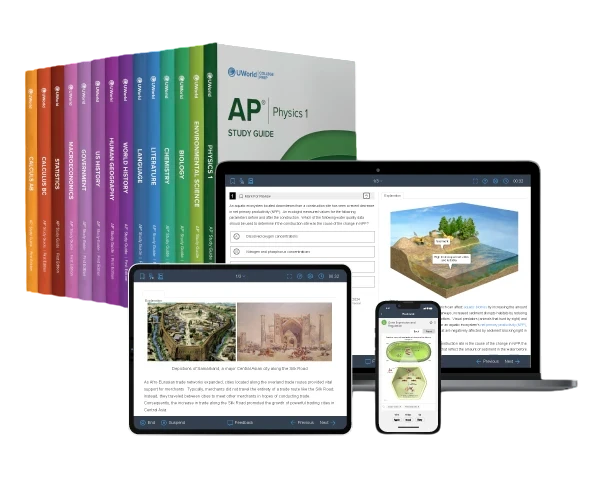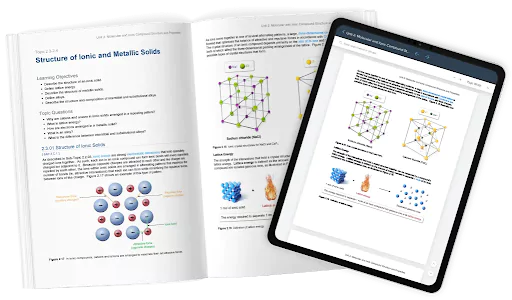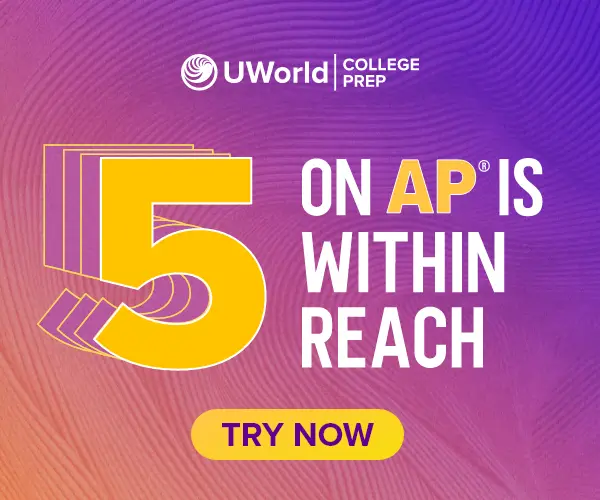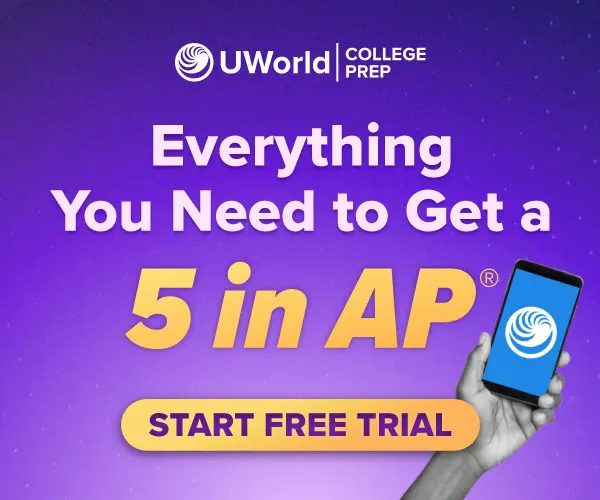Why Choosing the Right AP Books Matters
The Advanced Placement® (AP) Program, created by the College Board®, allows high school students to take college-level courses and earn credits through AP exams. With over 30 AP subjects offered, scoring well can save thousands in tuition and strengthen college applications.
The right prep book plays a critical role in the process. High-quality AP study guides help students:
- Simplify Complex Topics: Turn textbook material into manageable lessons.
- Practice Effectively: Provide exam-style questions and free-response practice.
- Build Test Skills: Teach test pacing, strategies, critical thinking, and time management.
- Stay Current: Updated editions match the latest AP Course and Exam Descriptions (CEDs).
What to Look for in the Best AP Study Books
Choosing the right AP prep book involves aligning your choice with your academic needs, learning style, and time constraints. Students often seek the best AP study books that balance content review with realistic practice. Some also pair the best AP textbooks taught in class with the best AP review book for targeted exam strategies. Here’s a strategic framework:
- Comprehensive Coverage
- Use the latest edition.
- Covers both multiple-choice and free-response questions.
- For new/revised subjects, use updated books or pair with resources like UWorld or Khan Academy.
- Learning Style Fit
- Comprehensive: UWorld, Barron’s, Princeton Review (in-depth, early prep).
- Focused: 5 Steps to a 5, Course, and Study Guides (targeted, last-minute).
- Visual/Interactive: UWorld (interactive diagrams, analytics).
- Sequential: Logical structure (UWorld, and Princeton Review).
- Practice Quality
- Detailed answer explanations.
- Online extras (tests, flashcards, analytics) add value.
- Leverage Reviews & Endorsements
- Past student reviews for insights.
- Teacher recommendations for reliability.
- Balance Depth & Brevity
- Early Prep: Detailed, textbook-style (UWorld, Barron’s).
- Last-Minute: Concise, test-focused (Course).
Best AP Prep Books: Complete Comparison of AP Study Guides & Tools
When preparing for AP exams, four publishers stand out: UWorld, Barron’s, Kaplan, and Princeton Review. Each plays a unique role among the best AP books available today. Below, we compare their features, practice quality, updates, pricing, and student ratings to help you find the best books for AP exams in 2026–2027.
| Feature / Benefit | UWorld 5/5 |
Barron’s 4.5/5 |
Princeton Review 4.4/5 |
Kaplan 4.3/5 |
|---|---|---|---|---|
| Format | Print + Digital (interactive with links, 6-month access for standalone digital). | Print (some with online) | Print + Some online | Mostly Print |
| Visual & Interactive Features | Rich visuals, adaptive flashcards, digital notebook, smart planner | Text-heavy, minimal visuals | Clean design, limited interactivity | Basic layouts |
| Practice Questions / QBank | 750–1,500+ AP-aligned questions per subject, detailed explanations | Full-length practice tests, but limited QBank | Multiple practice tests and drills | Fewer practice sets, some outdated |
| Progress Tracking & Analytics | Real-time dashboards, adaptive analytics | Static score reports | Basic summaries only | Minimal tracking |
| Update | Frequently updated to match latest College Board CED | Annual editions (sometimes lag) | Updated reasonably often | Some editions outdated (e.g., AP Stats 2014) |
| Test-Taking Strategy | Built-in exam simulations, timers, pacing tools | Exam tips, strategies included | Strong time-management & test strategies | Limited strategies |
| Pricing | $49 for study guides; $149 course | ~$18–21 per book | ~$22 per book; higher for live sessions | ~$18 per book |
| Reputation & Trust | Trusted across AP, SAT, ACT, MCAT, and USMLE prep | Known for rigor & depth | Popular for clarity & strategy | Mixed; budget-friendly but dated |
| Best For | Students wanting interactive, visual, adaptive prep | Students who want deep, challenging content | Students who prefer concise strategies & balanced review | Budget-conscious learners |
Top AP Prep Book Coverage by Publishers and Providers (2025-2026)
The best AP prep book isn’t about brand loyalty; it’s about finding a resource that matches your learning style and exam goals. While major publishers cover most AP subjects, the quality, usability, and exam alignment vary.
A strong match can mean the difference between skimming content and mastering it. Below, we look at how UWorld, Barron’s, Princeton Review, and Kaplan stack up in STEM, English, and Social Sciences.
UWorld
UWorld’s approach is built for mastery rather than memorization.
- STEM: Whether it’s visualizing atomic structure and chemical reactions in AP Chemistry, decoding genetics and ecosystems in AP Biology, breaking down mechanics and energy in AP Physics 1, mapping sustainability in AP Environmental Science, or tackling calculus and statistics in AP Calculus AB, AP Calculus BC, and AP Statistics, UWorld’s approach makes each topic accessible. Diagrams, step-by-step worked examples, and “Check for Understanding” questions turn abstract ideas into problem-solving skills, while digital flashcards keep learning targeted and efficient.
- English & Literature: Visual breakdowns of rhetorical devices, annotated passages, and plain-language literary analysis that blends rigor with readability in AP English Language and AP English Literature.
- Social Sciences & History: Unit-based structure aligned with the College Board®, timelines, concept maps, and realistic practice scenarios for analytical skills in AP Psychology, AP Human Geography, AP Macroeconomics, AP U.S. Government, AP U.S. History, and AP World History: Modern.
Barron’s
Barron’s is a powerhouse for content depth, but its density can be a double-edged sword.
- STEM: Comprehensive coverage with a reputation for rigor, but the textbook-like feel can be overwhelming.
- English & Literature: Thorough and detail-rich, yet heavy for those seeking quick revision.
- Social Sciences & History: Packed with information, but can be time-consuming to digest alongside multiple AP courses.
Princeton Review
Princeton Review excels at making AP prep approachable, but often prioritizes strategy over depth.
- STEM: Strong on test-taking tips and shortcuts; less emphasis on foundational mastery.
- English & Literature: Friendly tone and practical essay tips, though sometimes oversimplified.
- Social Sciences & History: Focused on pacing and boosting confidence, with lighter detail than UWorld or Barron’s
Kaplan
Kaplan offers a steady, middle-ground approach, though it can feel less specialized.
- STEM: While not as immersive in application-based learning as UWorld, it is clearer and more structured than Princeton Review.
- English & Literature: Well-organized and accessible, but literary analysis is often surface-level.
- Social Sciences & History: Straightforward summaries with basic practice; lacks the depth for advanced analysis.
Pros and Cons of the Best AP Prep Books & Tools
Every AP prep resource has its strengths and limitations. While some excel in rigor and content depth, others shine in accessibility, strategy, or interactive learning features. Understanding the pros and cons of UWorld, Barron’s, Kaplan, and Princeton Review can help you choose the best AP study guides for your goals.
- Exceptional Question Quality: UWorld's questions closely mirror the actual AP exam format and difficulty level, providing the most realistic practice experience.
- Detailed Explanations: Every question includes comprehensive explanations for both correct and incorrect answers, helping students understand underlying concepts.
- Performance Analytics: Advanced tracking system shows your progress, identifies weak areas, and provides personalized study recommendations.
- Adaptive Learning: The platform adjusts difficulty based on your performance, ensuring optimal challenge levels.
- Mobile-Friendly: Seamless experience across devices allows for flexible study sessions.
- Regular Updates: Content is frequently updated to reflect the latest AP exam changes.
- Subject-Specific Strengths: Particularly excellent for STEM subjects like Biology, Chemistry, and Physics.
- Limited Subjects: Not available for all AP subjects.
- Multiple full-length practice tests and hundreds of practice.
- Authors are typically experienced AP teachers or subject experts.
- Most books include thorough explanations for practice problems.
- Information Overload: Often includes more detail than necessary, which can overwhelm students with limited time.
- Outdated Editions: Some books may not reflect the most recent exam format changes.
- Inconsistent Quality: Quality varies significantly between subjects and authors.
- Dense Writing Style: Can be dry and textbook-like, making it difficult to maintain engagement.
- Limited Strategic Guidance: Focuses more on content than test-taking strategies.
- No Interactive Elements: Traditional book format lacks multimedia or adaptive features.
- Practice exams that closely mirror actual AP test conditions.
- Includes summary charts, key formulas, and rapid review sections.
- Many books come with online components and mobile apps.
- Less Comprehensive: Content coverage can feel lighter, which may not be enough for students seeking an in-depth review.
- Pricing Concern: Falls into a mid-range price bracket without offering many advanced digital features.
- Generic Approach: Strategies may be too general and not tailored enough to specific AP subjects.
- Online Components: Digital features often require additional registration and may be limited.
- Focus on practical test-taking techniques and shortcuts.
- Content is presented in an engaging, student-friendly manner.
- Well-constructed practice exams with detailed score analysis.
- Limited Content Depth: May not provide sufficient detail for students who need comprehensive review.
- Formulaic Approach: Some students find the strategies too mechanical or gimmicky.
- Variable Subject Coverage: Quality and depth vary significantly between different AP subjects.
- Cost: Can be expensive, especially for premium online courses and tutoring services.
- Over-Simplified: Sometimes oversimplifies complex topics in ways that may not be helpful for deeper understanding.
- Focus on Shortcuts: Emphasis on test tricks might not build genuine subject mastery.
Why UWorld AP Books Are The Best for 2025-2026– and Beyond
UWorld AP prep resources stand out from traditional best AP study books because they combine comprehensive content review, exam-style practice, and digital learning tools. Students consistently rate them among the most realistic and effective AP test prep books; not just for this year’s exams, but as a foundation for success in the 2026-2027 AP cycle as well.
- Focused & Complete: Every book covers essential topics and core concepts with concise notes written by expert educators.
- Easy to Understand: Plain-English explanations and colorful illustrations turn complex ideas into simple, clear lessons.
- Practice Built In: Each unit includes “Check for Understanding” questions and realistic scenarios, so you learn and apply concepts right away.
- Track Your Progress: Bolded key terms, end-of-topic questions, and smart checks help you spot gaps and review at your own pace.
- Study That Lasts: With digital flashcards and a customizable notebook, you’ll retain information longer and prep more efficiently.
- Flexible Options: Choose print, digital, or a full prep course—study your way and save while you do it.

Testimonials: Why Students Trust UWorld for AP Prep
Choosing the right AP prep resource can be the difference between struggling and scoring a 5. Students often call UWorld one of the best AP review book options because its explanations and practice mirror the real exam. Here’s what they’ve said:

UWorld was a game-changer for me. The explanations were so detailed that I actually understood why I got questions wrong. The practice felt just like the real exam, and by test day I felt completely confident. I ended up scoring a 5 on AP Biology, and I know UWorld was the reason."

Your product helped me realize how much more confident I can be with AP Exams coming up. I also needed very much to see what the MCQ would look like with exams that have changed post-pandemic and this website represents all the new updates thoroughly!”

The AP Stats exam may as well be called the UWorld exam. The questions in the multiple-choice section were literally identical to the ones on UWorld. EVEN THE ANSWER OPTIONS WERE IN THE SAME ORDER. Honestly, I’m so glad that I didn't waste my time doing 1,000 AP Stats questions."
Frequently Asked Questions (FAQs)
Which AP prep book is the best overall?
UWorld stands out as one of the best AP test prep books, thanks to its interactive platform, analytics, and realistic practice. Barron’s offers rigor and depth, Princeton Review emphasizes strategies, and Kaplan provides budget basics.
Are AP textbooks better than prep books?
The best AP textbooks provide comprehensive content coverage, often mirroring what’s taught in class. Prep books, on the other hand, focus on exam strategies, practice tests, and condensed reviews. For most students, the best results come from using both: a textbook for deep understanding and a prep book for exam-focused practice.
How many AP prep books should I use per subject?
In most cases, 1 strong prep book is all you need if you stick to a consistent study plan. UWorld’s AP prep book combines concise content review with exam-style practice questions and detailed explanations, so it can work as a complete resource on its own. Some students still like pairing it with a more traditional guide (like Barron’s for depth) if they want extra reading, but UWorld’s integrated approach usually gives enough coverage and practice to prepare effectively.
Are UWorld’s AP prep tools worth it?
Yes, especially if you prefer digital learning with analytics, visuals, and adaptive study plans. Many students on forums like Reddit rate UWorld highly because it mirrors real exam conditions and provides detailed explanations.
How do I choose the right AP prep book for me?
- Need a complete solution with clear content review, in-depth content, realistic practice, and smart digital tools? → UWorld.
- Want in-depth content? → Barron’s.
- Looking for affordable basics? → Kaplan.
- Prefer pacing strategies and test tips? → Princeton Review.
When should I start using AP prep books?
Ideally, begin 2–3 months before the exam for steady review. If you’re aiming for a 5, start earlier with textbooks and add one of the best AP test prep books closer to exam time.
References
- Reddit. (2023, July 11). Comment on “Best AP prep resources?” [Online forum post]. r/APStudents. https://www.reddit.com/r/APStudents/comments/14yasmb/comment/jrrn7p7/
- Reddit. (2023, July 11). Comment on “Best AP prep resources?” [Online forum post]. r/APStudents. https://www.reddit.com/r/APStudents/comments/14yasmb/comment/jrtjgig/





